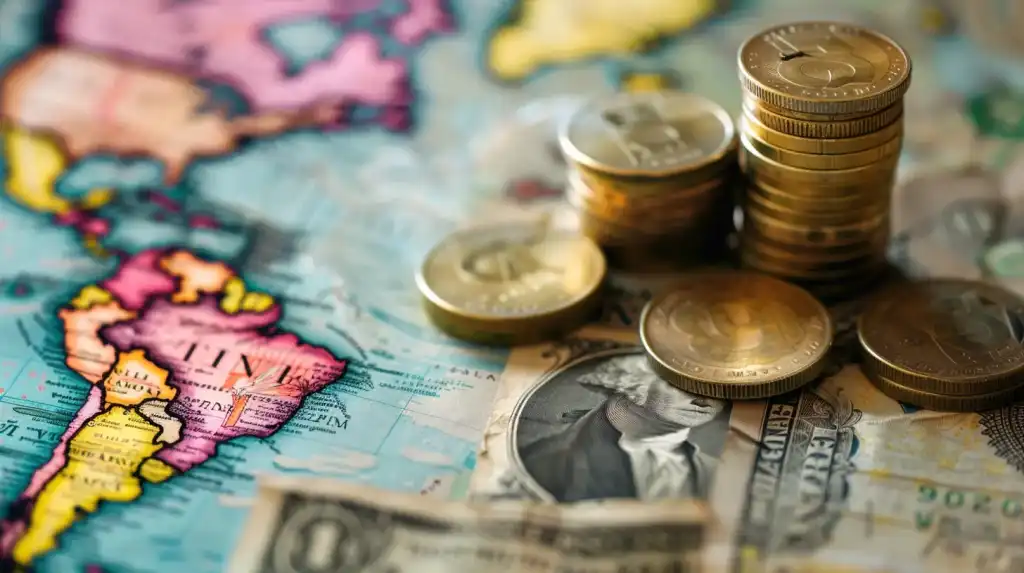01 January 2025
In today’s interconnected world, no financial market operates in a vacuum. From geopolitical tensions to pandemics, global events have a profound impact on everything from stock prices to commodity markets. But how exactly do these events shape financial markets? What happens to your investments when a major world event hits the news? Let’s dive into the nitty-gritty and break it down—without the complicated jargon.1. The Butterfly Effect of Global Events
You’ve probably heard of the butterfly effect, right? The idea that a butterfly flapping its wings in one part of the world can ultimately cause a tornado in another. Well, that’s a pretty good analogy for how global events impact financial markets. A political upheaval in a small country or a natural disaster halfway around the world can send shockwaves through global markets, affecting everything from currencies to stocks.

For example, when the COVID-19 pandemic hit in early 2020, it wasn’t just healthcare systems that were affected. Global supply chains were disrupted, leading to a decline in manufacturing output. Businesses shut down, unemployment spiked, and consumer spending plummeted. Stock markets around the world reacted quickly, with major indices like the S&P 500 and the FTSE 100 plunging. Investors, spooked by the economic uncertainty, pulled money out of risky assets and sought the safety of government bonds and gold.
Lesson? The seemingly distant events you read about in the news can directly impact your investments.
2. Geopolitical Tensions: The Market’s Worst Nightmare
Geopolitical events—think wars, trade disputes, or diplomatic tensions—are like the financial markets' version of horror movies. They inject uncertainty into the markets, and if there’s one thing investors hate, it’s uncertainty.
Take the U.S.-China trade war, for instance. For nearly two years, the world’s two largest economies were embroiled in a tit-for-tat tariff battle. Every time a new round of tariffs was announced, the markets reacted. Stocks in industries directly affected by the tariffs, like technology and agriculture, saw increased volatility. Investors worried that the escalating tensions could lead to a full-blown economic slowdown, and this uncertainty caused many to shift their portfolios toward safer assets.
But it’s not just about trade wars. Consider military conflicts like the Russia-Ukraine war in 2022. The global energy markets were heavily affected, with oil and gas prices skyrocketing as supply chains were disrupted. Europe, which relied heavily on Russian natural gas, scrambled to find alternative sources of energy. This, in turn, led to inflationary pressures, which central banks had to counter by raising interest rates.
Bottom line? Geopolitical tensions create volatility, and volatility can either be an investor’s best friend or worst enemy, depending on how prepared they are.
3. The Role of Central Banks: The Puppet Masters
Ever heard the saying, “Don’t fight the Fed”? It’s because central banks, like the Federal Reserve in the U.S., have a massive influence on financial markets. They’re the puppet masters pulling the strings behind the scenes. When global events unfold, central banks often step in to stabilize the financial system.
Take the 2008 financial crisis, for example. When Lehman Brothers collapsed, panic spread through the financial markets, and stock prices plummeted. In response, the Federal Reserve slashed interest rates to near zero and launched quantitative easing (QE)—essentially printing money to buy government bonds and other financial assets. This flood of liquidity helped to stabilize the markets and eventually led to a recovery.
Similarly, during the COVID-19 pandemic, central banks around the world stepped in with unprecedented levels of monetary stimulus. The Federal Reserve, the European Central Bank, and others slashed interest rates and pumped trillions of dollars into the markets. This helped to prevent a deeper economic collapse and led to a rapid recovery in stock prices.
Key takeaway? When global events shake the markets, central banks often come to the rescue, but their actions can also create new challenges for investors. Low interest rates, for example, make it difficult for savers to earn a decent return on their investments.
4. The Rise of Inflation: A Silent Thief
Let’s talk about inflation. It’s often called a “silent thief” because it erodes your purchasing power over time. When inflation rises, the value of money decreases, and the cost of goods and services goes up. So, what causes inflation to spike? You guessed it—global events.
For instance, the COVID-19 pandemic led to massive supply chain disruptions, which reduced the availability of goods. At the same time, governments were pumping stimulus money into their economies to keep them afloat. The result? Too much money was chasing too few goods, and inflation surged. In 2022, inflation in the U.S. hit a 40-year high, with the consumer price index (CPI) rising by more than 8%.
Global events like wars can also drive up inflation. When Russia invaded Ukraine, the price of oil and wheat soared, pushing up the cost of energy and food worldwide. Inflation isn’t just an economic problem—it has a direct impact on financial markets. When inflation rises, central banks often respond by raising interest rates. Higher rates make borrowing more expensive, which can slow down economic growth and hurt corporate profits. As a result, stock markets tend to suffer.
Moral of the story? Keep an eye on inflation. It’s a key factor that can shape the direction of financial markets, and it’s often driven by global events.
5. Technological Disruptions: The Game Changer
Let’s switch gears a bit and talk about technology. While we often think of global events as political or economic in nature, technological advancements can also have a huge impact on financial markets. In fact, they’re often the most disruptive.
Take the rise of cryptocurrencies, for example. Bitcoin, Ethereum, and other digital currencies have completely changed the way investors think about money. Once considered a fringe asset, Bitcoin is now a mainstream investment, with institutional investors pouring billions of dollars into the cryptocurrency market. The rise of blockchain technology, which underpins cryptocurrencies, has also disrupted traditional financial systems, leading to the development of decentralized finance (DeFi) platforms.
But it’s not just about crypto. Think about the rise of renewable energy. As the world shifts away from fossil fuels, companies involved in solar, wind, and electric vehicles (EVs) are seeing massive growth. Tesla, for instance, has become one of the most valuable companies in the world, thanks to the increasing demand for EVs.
So what’s the deal? Technological disruptions can create new investment opportunities, but they can also lead to increased volatility as markets adjust to the new reality.
6. The Importance of Diversification: Don’t Put All Your Eggs in One Basket
Given the unpredictable nature of global events, one of the best ways to protect your investments is through diversification. You’ve probably heard the saying, “Don’t put all your eggs in one basket.” In other words, don’t concentrate all your investments in one asset class or market.
When global events shake financial markets, having a diversified portfolio can help you weather the storm. For example, during the COVID-19 pandemic, tech stocks like Amazon and Zoom skyrocketed as more people shifted to online shopping and remote work. On the other hand, industries like travel and hospitality were hit hard. If you had all your money invested in travel stocks, you would have taken a significant hit. But if you had a diversified portfolio that included tech stocks, you would have been better positioned to ride out the volatility.
Pro tip: Diversification doesn’t just mean investing in different stocks. It also means spreading your investments across different asset classes, such as bonds, real estate, and commodities. This can help reduce your overall risk and improve your long-term returns.
7. How to Respond as an Investor: Stay Calm and Keep Investing
So, how should you respond when global events start shaking the markets? The answer is simple: stay calm and keep investing. It’s easy to get caught up in the panic when markets are crashing, but the worst thing you can do is sell in a panic.
Remember, financial markets are cyclical. They go through periods of boom and bust, but over the long term, they tend to rise. If you sell in a panic, you’ll lock in your losses and miss out on the recovery. Instead, focus on your long-term investment goals and stick to your plan.
If anything, global events can create buying opportunities. When stock prices fall, you can buy high-quality companies at a discount. Think of it like a shopping sale—would you rather buy something at full price or when it’s on sale?
In a nutshell? Stay calm, stay invested, and look for opportunities to buy when others are selling.
Conclusion: The World is Bigger Than Your Portfolio
At the end of the day, global events are an inevitable part of investing. Whether it’s a pandemic, a war, or a technological breakthrough, the world is constantly changing, and financial markets will react accordingly. But here’s the thing: while you can’t control global events, you can control how you respond to them.
By staying informed, diversifying your portfolio, and keeping a long-term perspective, you can navigate the ups and downs of the market and come out ahead. So the next time a major global event makes headlines, remember: it’s not the end of the world—it’s just another chapter in the ever-evolving story of financial markets.
TL;DR: Global events shape financial markets in unpredictable ways. Stay calm, diversify, and keep a long-term perspective.


